2018-2019学年九年级英语全册 Unit 1 How can we become good learners Section B(3a-Self Check)课后作
九年级英语全册Unit1Howcanwebecomegoodlearners典型例题(带答案)

九年级英语全册Unit1Howcanwebecomegoodlearners典型例题单选题1、Developing good reading habits can ___________ our reading speed. A.reviewB.receiveC.spreadD.increase答案:D句意:培养好的阅读习惯可以提高我们的阅读速度。
考查动词辨析。
review回顾;receive收到;spread传播;increase提高。
根据Developing good reading habits及our reading speed,可知,培养好的阅读习惯可以提高阅读速度,所以空格处填increase。
故选D。
2、I learn English ________ practicing conversations with friends.A.onB.byC.inD.of答案:B句意:我通过和朋友们练习对话学习英语。
考查介词词义辨析。
on在……上;by由,凭借,通过;in在……内;of……的。
题干中“practicing conversations with friends”是“I learn English”的方法,因此by符合语境。
故选B。
3、—It’s smoggy these days. That’s terrible!— Yes, I hope to plant trees. ________ trees, _________ air pollution.A.The more; the fewerB.The less; the moreC.The less; the fewerD.The more; the less答案:D句意:——这几天都有大雾。
那太糟糕了!——是的,我希望去植树。
树越多,空气污染越少。
考查形容词的比较级。
根据常识可知,树越多,空气污染则越少。
两个“the+形容词的比较级”表示越……越……。
(全新)人教版九年级全册英语课文翻译
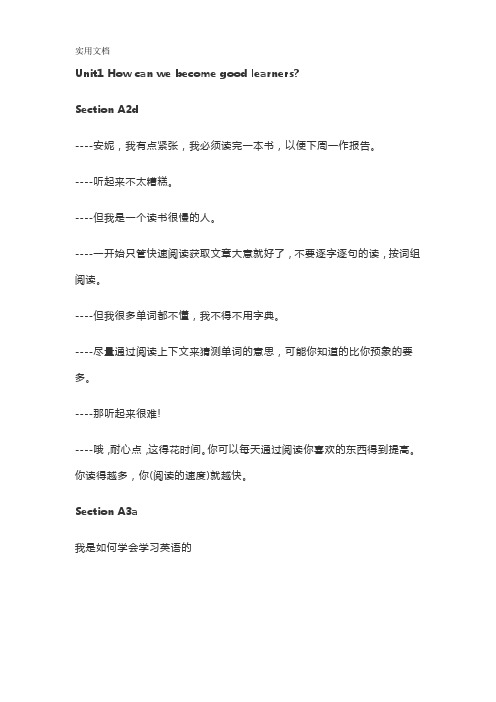
Unit1 How can we become good learners?Section A2d----安妮,我有点紧张,我必须读完一本书,以便下周一作报告。
----听起来不太糟糕。
----但我是一个读书很慢的人。
----一开始只管快速阅读获取文章大意就好了,不要逐字逐句的读,按词组阅读。
----但我很多单词都不懂,我不得不用字典。
----尽量通过阅读上下文来猜测单词的意思,可能你知道的比你预象的要多。
----那听起来很难!----哦,耐心点,这得花时间。
你可以每天通过阅读你喜欢的东西得到提高。
你读得越多,你(阅读的速度)就越快。
Section A3a我是如何学会学习英语的去年,我不喜欢我的英语课。
每节课像是一个噩梦。
老师说的太快以至于我大多数时候都听不太懂。
因为我糟糕的发音,我害怕问问题。
我只是躲在我的课本后面,从来不说一句话。
后来有一天我看了一部叫做《玩具总动员》的英语电影。
我爱上了这部既激动人心又滑稽有趣的电影!就这样我也开始看其他的英文电影。
虽然我无法听懂那些角色所说的全部内容,但他们的肢体语言和面部表情帮助我理解了意思。
我也意识到我可以通过只听关键词来理解意思。
通过听英文电影中的对话,我的发音也变的更好了。
我发现听一些有趣的内容是学习语言的秘诀。
我还学到了一些有用的句子比如“这简直是小菜一碟”或者“你活该”。
我起初不理解这些句子,但是因为我想理解这个故事,所以我查了字典。
现在我真的喜欢我的英语课。
我想学习生词和更多的语法,那样我对英语电影就能有更好的理解了。
SectionB2b怎么成为一个成功的学习者呢?每个人天生就拥有学习的能力。
但是你能否学习的好取决于你的学习习惯。
研究显示成功的学习者有一些共同的好习惯。
1.培养他们对所学东西的兴趣研究显示,如果你对某事物感兴趣,你的大脑会更活跃而且对你来说长时间地关注那个事物也容易些。
善于学习的人经常把他们需要学的事物与一些有趣的事物联系起来。
九年级英语全册 Unit 1 How can we become good learners?单元综

九年级英语全册 Unit 1 How can we become good learners?单元综合评价检测(新版)人教新目标版(45分钟100分)第Ⅰ卷(共50分)Ⅰ. 听力(10分)(Ⅰ)录音中有五个句子, 听一遍后, 选择最佳答语。
(5分)1. A. It’s too hard. B. It’s easy.C. By listening to tapes.2. A. Yes, I have. B. Yes, I do.C. Yes, I can.3. A. No, we don’t. B. Good idea.C. Yes, please.4. A. Me too.B. You’re welcome.C. It doesn’t matter.5. A. For three years. B. Twice a year.C. Three years ago.【听力材料】1. How do you improve your listening skills?2. Do you often watch English-language videos?3. Let’s join an English club to practice spoken English.4. Sorry, I don’t know how to pronounce the word.5. How long have you been learning English?答案: 1~5. CBBCA(Ⅱ)录音中有一篇短文, 听两遍后, 选择最佳答案。
(5分)6. The writer thinks that the most important thing for you to learn a language is .A. readingB. practicingC. listening7. What should you do in learning English?A. Try to make some mistakes.B. Avoid making any mistakes.C. Use it as often as possible.8. If people laugh at the mistakes you make, you should .A. be angry with themB. believe you are rightC. not care9. When you make a mistake, you should .A. never make any mistakes againB. tell others not to make the same mistakeC. keep your sense of humor10. The text t ells us, “. ”A. It is normal(正常的)that we make some mistakes in learning EnglishB. We can avoid making mistakes in learning a languageC. Laughing can help one learn English well【听力材料】The best way of learning a language is using it. The best way of learning English is speaking English as much as possible. Sometimes you’ll get your words mixed up and people will not understand you. Sometimes people will speak too quickly and you can’t understand them. But if you keep your sense of humor, you can always have a good laugh at the mistakes you make. Don’t be unhappy if people seem to be laughing at your mistakes. It’s better for people to laugh at your mistakes than to be angry with you, because they don’t understand what you are saying. The most important thing for learning English is, “Don’t be afraid of making mistakes because everyone makes mistakes. ”答案: 6~10. BCCCAⅡ. 单项选择(20分)1. These kids practice spoken English joining the English club.A. byB. inC. onD. with【解析】选A。
人教版九年级全册Unit 1 How Can we become good learners 短文
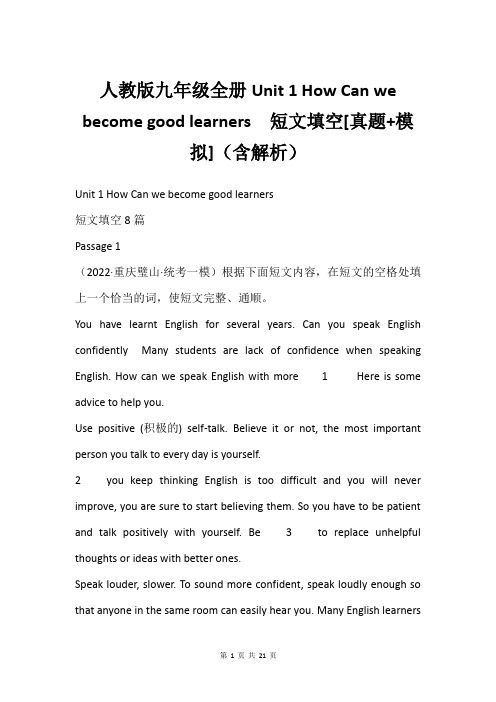
人教版九年级全册Unit 1 How Can we become good learners 短文填空[真题+模拟](含解析)Unit 1 How Can we become good learners短文填空8篇Passage 1(2022·重庆璧山·统考一模)根据下面短文内容,在短文的空格处填上一个恰当的词,使短文完整、通顺。
You have learnt English for several years. Can you speak English confidently Many students are lack of confidence when speaking English. How can we speak English with more 1 Here is some advice to help you.Use positive (积极的) self-talk. Believe it or not, the most important person you talk to every day is yourself.2 you keep thinking English is too difficult and you will never improve, you are sure to start believing them. So you have to be patient and talk positively with yourself. Be3 to replace unhelpful thoughts or ideas with better ones.Speak louder, slower. To sound more confident, speak loudly enough so that anyone in the same room can easily hear you. Many English learnersworry that 4 too slowly will make them sound inexperienced. But speaking too fast may cause mistakes. So avoid worrying that you are speaking too slowly for the people 5 you.Speak in complete sentences. If you are not confident in your language ability, you will probably try to say as little as possible when you speak. This is a 6 problem for language learners. But using complete sentences can show others that you are not afraid to speak English. Read out loud. It can help build confidence in how your English sounds. The next time you are reading something, take a few minutes to read it aloud. First, read silently. 7 , listen to the radio. Third, try to read the story out loud 8 . At last, try listening to the speaker and reading out loud at the same time.Passage 2(2022秋·广东汕头·九年级统考期末)请用适当的词完成下面这篇短文。
九年级英语全册 Unit 1 How can we become good learners Self Check习题(含答案)

Unit 1 How can we become good learnersSelf CheckⅠ.根据句意及首字母提示填写单词。
1.Marie Curie was the scientist that first discovered radium(镭).2.Can you repeat what you said just now? I didn't hear you clearly.3.Do you often make conversations with your partner in English class?4.If you are shy,you can smile before you start a conversation with others.5.Now Lucy pays more attention to her grades instead of her clothes.Ⅱ.用括号内所给单词的适当形式填空。
6.Almost everyone thinks the girl has a lovely pronunciation (pronounce).7.He studied his map,trying to memorize(memory) the way to Jack's house.8.Everyone thinks the little boy was born(bear) with the ability to sing.9.“Did I win first prize?” Jim asked with an expression(express) of surprise on his face.10.Do you know the story of how God created(create) the world?Ⅲ.根据汉语意思及括号内所给的英文提示,把下列句子译成英语。
2019秋九年级英语全册Unit1How can we become good learners SectionA1a_2d作业设计

Unit 1 Section A 1a-2d(总分:100分时间:60分钟)I. 单项选择(本题包括10小题,每题2分,共20分)1. We can save money _______ cooking our own meals instead of eating outside.A. byB. toC. forD. with2. There’s a policeman over there. Let’s go and ask him_______.A. to helpB. for helpC. for helpingD. for helps3. Reading English newspaper can help you learn English_______.A. a lotB. a lot ofC. lots ofD. lot4. The little girl shouted ______ when she couldn’t find her mother.A. loudB. aloudC. louderD. loudly5. Don’t always cry . I don’t think it ______.A. likesB. doesC. doD. helps6. --- How do you study ______ a test? --- I study ______ working with a group.A. by, /B. by, atC. for, /D. for, by7. ______ students have learned ______ from the stories.A. A lot of, a lot ofB. A lot, a lot ofC. A lot, lots ofD. A lot of,a lot8. Why did Wei Fen find _____ difficult to learn English?A. thatB. itC. it’sD. it is9. I think he is _______ young _______ go to school.A. so, thatB. so, toC. too, toD. enough , to10. --- How could I improve my writing?--- ________ writing e-mails to your pen pal?A. Why notB. Why don'tC. HowD. How aboutII. 根据汉语意思完成句子,每空一词(本题包括7小题,每空1分,共20分)11. 我们通过朗读来提高我们的英语口语水平。
(全新)人教版九年级全册英语课文翻译
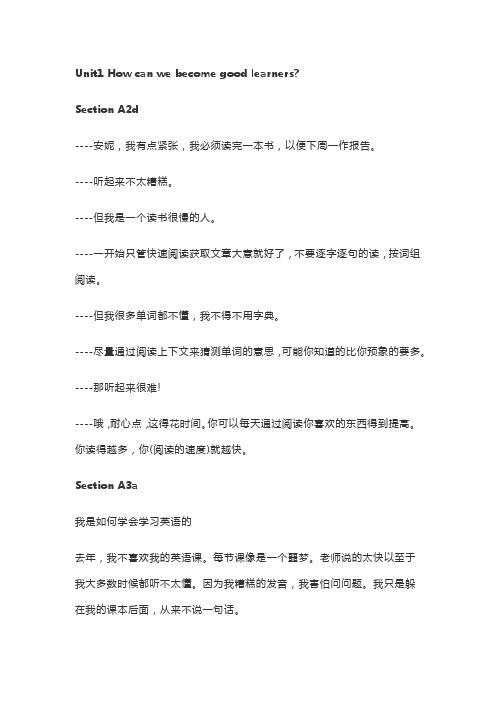
Unit1 How can we become good learners?Section A2d----安妮,我有点紧张,我必须读完一本书,以便下周一作报告。
----听起来不太糟糕。
----但我是一个读书很慢的人。
----一开始只管快速阅读获取文章大意就好了,不要逐字逐句的读,按词组阅读。
----但我很多单词都不懂,我不得不用字典。
----尽量通过阅读上下文来猜测单词的意思,可能你知道的比你预象的要多。
----那听起来很难!----哦,耐心点,这得花时间。
你可以每天通过阅读你喜欢的东西得到提高。
你读得越多,你(阅读的速度)就越快。
Section A3a我是如何学会学习英语的去年,我不喜欢我的英语课。
每节课像是一个噩梦。
老师说的太快以至于我大多数时候都听不太懂。
因为我糟糕的发音,我害怕问问题。
我只是躲在我的课本后面,从来不说一句话。
后来有一天我看了一部叫做《玩具总动员》的英语电影。
我爱上了这部既激动人心又滑稽有趣的电影!就这样我也开始看其他的英文电影。
虽然我无法听懂那些角色所说的全部内容,但他们的肢体语言和面部表情帮助我理解了意思。
我也意识到我可以通过只听关键词来理解意思。
通过听英文电影中的对话,我的发音也变的更好了。
我发现听一些有趣的内容是学习语言的秘诀。
我还学到了一些有用的句子比如“这简直是小菜一碟”或者“你活该”。
我起初不理解这些句子,但是因为我想理解这个故事,所以我查了字典。
现在我真的喜欢我的英语课。
我想学习生词和更多的语法,那样我对英语电影就能有更好的理解了。
SectionB2b怎么成为一个成功的学习者呢?每个人天生就拥有学习的能力。
但是你能否学习的好取决于你的学习习惯。
研究显示成功的学习者有一些共同的好习惯。
1.培养他们对所学东西的兴趣研究显示,如果你对某事物感兴趣,你的大脑会更活跃而且对你来说长时间地关注那个事物也容易些。
善于学习的人经常把他们需要学的事物与一些有趣的事物联系起来。
九年级英语全一册(1-14单元)知识点归纳

新人教版九年级英语全册知识点归纳及习题(最新)Unit 1 How can we become good learners?一、短语总结:1. good learners 优秀的学习者2. work with friends 和朋友一起学习3. study for a test 备考4.have conversations with 与……交谈5.speaking skills 口语技巧6.a little 有点儿7.at first 起初;起先8.the secret to......,.......的秘诀9.because of 因为10.as well 也11.look up (在词典中等)查阅;抬头看12.so that 以便,为了13.the meaning of ……的意思14.make mistakes 犯错误15.talk to 交谈16.depend on 依靠;依赖17.in common 共有的18.pay attention to 注意;关注19.connect ……with ……把……联系。
20.for example 例如21.think about 考虑22.even if 即使;尽管;纵容23.look for 寻找24.worry about 担心担忧25.make word cards 制作单词卡片26.ask the teacher for help 向老师求助27.read aloud 大声读28.spoken English 英语口语29.give a report 作报告30.word by word 一字一字地31.so……that 如此……以至于32.fall in love with 爱上33.something interesting 有趣的事情34.take notes 记笔记35.how often 多久一次36.a lot of 许多37.the ability to do sth. 做某事的能力38.learning habits 学习习惯39.be interested in 对……感兴趣40.get bored 感到无聊41.be good at 在……方面擅长42.be afraid of 害怕43.each other 彼此互相44.instead of 代替而不是二.用法集萃1. by doing sth. 通过做某事2.it +be+adj.+to do sth. 做某事是……的3.finish doing sth. 完成某事4.what about doing sth.?做某事怎么样?5.try to do sth. 尽力做某事6.the +比较级,the+比较级越……,就越……7.find it+adj.+to do sth. 发现做某事8.be afraid of doing sth. 害怕做某事9.help sb. (to) do sth. 帮助某人做某事10.practice doing sth. 练习做某事11.keep doing sth. 一直做某事12.be afraid to do sth. 害怕做某事13.begin to do sth. 开始做某事14.want to do sth. 想要做某事15.need to do sth. 需要做某事16.remember to do sth. 记得做某事17.shoot 射(射着,射死等表结果)18.shoot at(瞄准)射Unit1 检测题一.单项选择1.—_______ do you study English? —By listening to tapes.A. HowB. WhereC. WhenD. Why2.You can improve your English practicing more. A.by B.with C.of D.in3. Why not practice your _________English in _________ English-speaking country?A. speaking, aB. speaking, anC. spoken, an4. ______conversations with others is one of the secrets to _____a successful learner.A. Practice, becomeB. Practice, becomingC. Practicing, becoming5 ---There’re a few new words in the article? ---What about _________in your dictionary? A. looking it up B. looking up it C. looking them up6. We’ll go out to play ______ it rains tomorrow. A. so B. unless C. because7. Can you __which is the right answer to the question? A. look for B. find C. find out8. Jenny used to be afraid to ________in class, so she always ________nothing.A. speak, talkedB. speak, saidC. say, spoke9.— Why not listen to BBC news to improve your listening skills?—It’s ______ difficult _____ I can’t follow. A. too; to B. so; that C. such; that10. A good learner often thinks about ________he needs to practice more.A. thatB. whatC. how11.--I’m g oing to listen ____the tape. --OK. Remember to listen ____the key words.A. to, toB. to ,forC. for, to12. ________or not you can learn well depends on your learning habits.A. IfB. WeatherC. Whether13. I have finished _________my report. May I start to learn ________the guitar?A. writing, playingB. writing, to playC. to write, playing14. ---I often make mistakes ____grammar. ---Why not ask your teacher ____help?A. in, toB. in, forC. at, to15. _________write down the new words in your notebook?A. Would you likeB. How aboutC. Could you please16. ---Jack used to have ____writing practice. ---Yes, and he had learned ______.A. a lot of, a lot ofB. a lot of, a lotC. a lot, a lot of17. The more careful you are, ________mistakes you’ll make.A. fewerB. the fewerC. the less18. G ood learners aren’t afraid _____mistakes. Instead, they learn ________mistakes.A. of making, inB. to make, fromC. to make, in19. For the first time, pay attention _________quickly to get the main ideas.A. to readB. readingC. to reading20.I discovered that listening to is the secret language learning.A. something interesting, toB. interesting something, toC. something interested, ofD. interested something of21.Jenny found it very easy English well.A. learningB. to learnC. learnD. learned22. He_____ with the girl with golden hair and will soon get married____ her.A. falls in love; toB. is in love; toC. loves; withD. loves; to23. My father thinks _____ is a great way to learn English.A. study grammar.B. I study grammar.C. studying grammar.D. studies grammar24 Why not ___ your teacher for help when you can’t finish _____ it by yourself?A. ask; writeB. to ask; writingC. ask; writingD. asking; write25. — I wonder if I can learn English well.—. All things are difficult before they are easy.A. I am afraid soB. You’re slowC. It takes timeD. It’s a piece of cake26 You’ll find _____________ easy to learn it well. A. that B. its C. it D. this27. –I don’t have a partner to practice English ______________.---Why not join an English language club to practice _______________?A. /; speakingB. with; to speakC. /; to speakD. with; speaking28. ---She hardly makes mistakes _________English grammar.---No, it seems that she was born ________the ability to learn languages.A. in, withB. with, inC. in, inD. with, with二用所给单词的适当形式填空。
九年级英语全册Unit1Howcanwe(第1课时

in English?
第十三页,共四十页。
3. __ What about listening to tapes?
4. __ What about reading aloud to practice pronunciation?
papers. by …
第六页,共四十页。
by + v.-ing
常常表示手段、方式或方法,可以用来
回答(huídá)how引导的特殊疑问句。
—How do you learn English? —I learn English by watching
English movies.
第七页,共四十页。
第二十九页,共四十页。
现在(xiànzài)完成时&一般过去时
现在完成时 一般过去时
同
都和过去发生的事情有关
异
强调这一动作与 现在的关系,如 对现在产生的结
thing you enjoy every day. The more
you read, the faster you’ll be.
第二十页,共四十页。
Language Points
1. how引导(yǐndǎo)特殊疑问句
①how 用来询问(xúnwèn)做事的方式或手段,
意为 “怎样、如何”。
房屋被火烧毁了。
第二十四页,共四十页。
另外, by作为介词的意义有很多, 例如: 1)在…...旁边,靠近(kàojìn)
There is a power station by the river.
河边有一个电厂。
2)沿着,经由 to enter by the door 由门进去
九年级英语全册Unit1HowcanwebecomegoodlearnersSectionA(Gr

九年级英语全册Unit 1 How can we become good learners Section A(Grammar Focus-4c)教案(新版)人教新目标版编辑整理:尊敬的读者朋友们:这里是精品文档编辑中心,本文档内容是由我和我的同事精心编辑整理后发布的,发布之前我们对文中内容进行仔细校对,但是难免会有疏漏的地方,但是任然希望(九年级英语全册Unit 1 How can we become good learners Section A(Grammar Focus-4c)教案(新版)人教新目标版)的内容能够给您的工作和学习带来便利。
同时也真诚的希望收到您的建议和反馈,这将是我们进步的源泉,前进的动力。
本文可编辑可修改,如果觉得对您有帮助请收藏以便随时查阅,最后祝您生活愉快业绩进步,以下为九年级英语全册Unit 1 How can we become good learners Section A(Grammar Focus-4c)教案(新版)人教新目标版的全部内容。
Unit 1 How can we become good learners?Section A3 (Grammar Focus—4c)Step 1 Free talkTalk about the ways you learn other subjects. You can use the following phrases and sentences。
How do you learn Chinese/ math /physics/chemistry?Do you learn history and geography by___________?Step 2 4aAnswer the questions。
Then match the questions and answers.1. How do you practice speaking?2。
九年级全一册英语知识点归纳
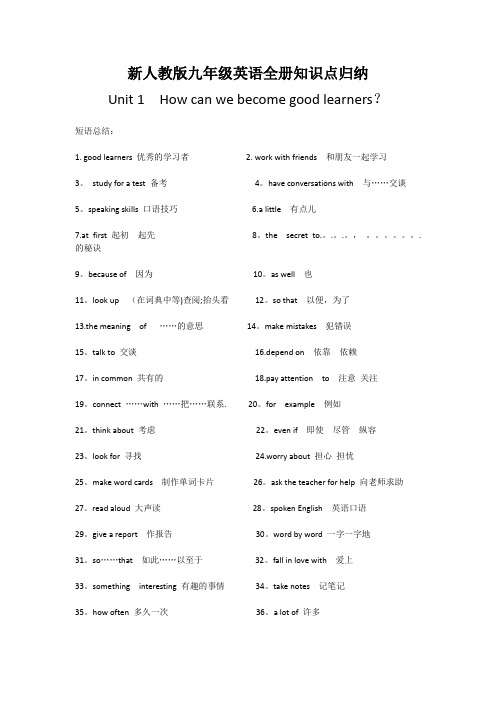
新人教版九年级英语全册知识点归纳Unit 1 How can we become good learners?短语总结:1. good learners 优秀的学习者2. work with friends 和朋友一起学习3。
study for a test 备考4。
have conversations with 与……交谈5。
speaking skills 口语技巧 6.a little 有点儿7.at first 起初起先8。
the secret to.。
.。
.。
,。
.的秘诀9。
because of 因为10。
as well 也11。
look up (在词典中等)查阅;抬头看12。
so that 以便,为了13.the meaning of ……的意思14。
make mistakes 犯错误15。
talk to 交谈16.depend on 依靠依赖17。
in common 共有的18.pay attention to 注意关注19。
connect ……with ……把……联系. 20。
for example 例如21。
think about 考虑22。
even if 即使尽管纵容23。
look for 寻找24.worry about 担心担忧25。
make word cards 制作单词卡片26。
ask the teacher for help 向老师求助27。
read aloud 大声读28。
spoken English 英语口语29。
give a report 作报告30。
word by word 一字一字地31。
so……that 如此……以至于32。
fall in love with 爱上33。
something interesting 有趣的事情34。
take notes 记笔记35。
how often 多久一次36。
a lot of 许多37。
the ability to do sth. 做某事的能力38.learning habits 学习习惯39.be interested in 对……感兴趣40.get bored 感到无聊41.be good at 在……方面擅长42.be afraid of 害怕43。
(完整版)新人教版九年级英语全册各单元单词表(含音标)
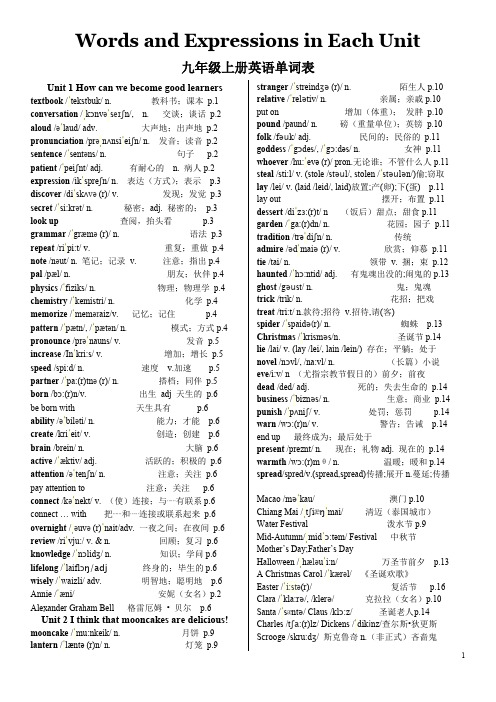
Words and Expressions in Each Unit九年级上册英语单词表Unit 1 How can we become good learners textbook /ˈtekstbuk/ n. 教科书;课本p.1 conversation /ˌkɔnvəˈs eɪʃn/, n. 交谈;谈话p.2 aloud /əˈlaud/ adv. 大声地;出声地p.2 pronunciation /prəˌnʌnsiˈeiʃn/ n. 发音;读音p.2 sentence /ˈsentəns/ n. 句子p.2 patient /ˈpeiʃnt/ adj. 有耐心的n. 病人p.2 expression /ikˈspreʃn/ n. 表达(方式);表示p.3 discover /diˈskʌvə (r)/ v. 发现;发觉p.3 secret /ˈsi:krət/ n. 秘密;adj. 秘密的;p.3 look up查阅,抬头看p.3 grammar /ˈgræmə (r)/ n. 语法p.3 repeat /riˈpi:t/ v. 重复;重做p.4 note /nəut/ n. 笔记;记录v. 注意;指出p.4 pal /pæl/ n. 朋友;伙伴p.4 physics /ˈfiziks/ n. 物理;物理学p.4 chemistry /ˈkemistri/ n. 化学p.4 memorize /ˈmemər aiz/v. 记忆;记住p.4 pattern /ˈpætn/, /ˈpætən/ n. 模式;方式p.4 pronounce /prəˈnauns/ v. 发音p.5 increase /Inˈkri:s/ v. 增加;增长p.5 speed /spi:d/ n. 速度v.加速p.5 partner /ˈpa:(r)tnə (r)/ n. 搭档;同伴p.5 born /bɔ:(r)n/v. 出生adj 天生的p.6 be born with 天生具有p.6 ability /əˈbiləti/ n. 能力;才能p.6 create /kriˈeit/ v. 创造;创建p.6 brain /brein/ n. 大脑p.6 active /ˈæktiv/ adj. 活跃的;积极的p.6 attention /əˈtenʃn/ n. 注意;关注p.6 pay attention to 注意;关注p.6 connect /kəˈnekt/ v. (使)连接;与⋯⋯有联系p.6 connect … with 把⋯⋯和⋯⋯连接或联系起来p.6 overnight /ˌəuvə (r)ˈnait/adv. 一夜之间;在夜间p.6 review /riˈvju:/ v. & n. 回顾;复习p.6 knowledge /ˈnɔlidʒ/ n. 知识;学问p.6 lifelong /ˈlaiflɔŋ/adj终身的;毕生的p.6 wisely /ˈwaizli/ adv. 明智地;聪明地p.6 Annie /ˈæni/ 安妮(女名)p.2 Alexander Graham Bell 格雷厄姆• 贝尔p.6 Unit 2 I think that mooncakes are delicious! mooncake /ˈmu:nkeik/ n. 月饼p.9 lantern /ˈlæntə (r)n/ n. 灯笼p.9 stranger /ˈstreindʒə (r)/ n. 陌生人p.10 relative /ˈrelətiv/ n. 亲属;亲戚p.10 put on 增加(体重);发胖p.10 pound /paund/ n. 磅(重量单位);英镑p.10 folk /fəu k/ adj. 民间的;民俗的p.11 goddess /ˈgɔdes/, /ˈgɔ:dəs/ n. 女神p.11 whoever /hu:ˈevə (r)/ pron.无论谁;不管什么人p.11 steal /sti:l/ v. (stole /stəu l/, stolen /ˈstəu lən/)偷;窃取lay /lei/ v. (laid /leid/, laid)放置;产(卵);下(蛋) p.11 lay out 摆开;布置p.11 dessert /diˈzɜ:(r)t/ n (饭后)甜点;甜食p.11 garden /ˈga:(r)dn/ n. 花园;园子p.11 tradition/trəˈdiʃn/ n. 传统admire /ədˈmaiə (r)/ v. 欣赏;仰慕p.11 tie /tai/ n. 领带v. 捆;束p.12 haunted /ˈhɔ:ntid/ adj. 有鬼魂出没的;闹鬼的p.13 ghost /gəu st/ n. 鬼;鬼魂trick /trik/ n. 花招;把戏treat /tri:t/ n.款待;招待v.招待,请(客)spider /ˈspaidə(r)/ n. 蜘蛛p.13 Christmas /ˈkrisməs/n. 圣诞节p.14 lie /lai/ v. (lay /lei/, lain /lein/) 存在;平躺;处于novel /nɔvl/, /na:vl/ n. (长篇)小说eve/i:v/ n (尤指宗教节假日的)前夕;前夜dead /ded/ adj. 死的;失去生命的p.14 business /ˈbiznəs/ n. 生意;商业p.14 punish /ˈpʌniʃ/ v. 处罚;惩罚p.14 warn /wɔ:(r)n/ v. 警告;告诫p.14 end up 最终成为;最后处于present /preznt/ n. 现在;礼物adj. 现在的p.14 warmth /wɔ:(r)mθ/ n. 温暖;暖和p.14 spread/spred/v.(spread,spread)传播;展开n.蔓延;传播Macao /məˈkau/ 澳门p.10 Chiang Mai /ˌtʃiæŋˈmai/ 清迈(泰国城市)Water Festival 泼水节p.9Mid-Autumn/ˌmidˈɔ:təm/ Festival 中秋节Mother’s Day;Father’s DayHalloween /ˌhæləuˈi:n/ 万圣节前夕p.13 A Christmas Carol /ˈkærəl/ 《圣诞欢歌》Easter /ˈi:stə(r)/ 复活节p.16 Clara /ˈkla:rə/, /klerə/ 克拉拉(女名)p.10 Santa /ˈsæntə/ Claus /klɔ:z/ 圣诞老人p.14 Charles /tʃa:(r)lz/ Dickens /ˈdik i nz/查尔斯•狄更斯Scrooge /skru:dʒ/ 斯克鲁奇n.(非正式)吝啬鬼Jacob /ˈdʒeikəb/ Marley /ˈma:(r)li/雅各布• 马利Unit 3 Could you please tell me where the restrooms are? restroom/ˈrestru:m/ n. (美)洗手间;公共厕所p.17 stamp /stæmp/ n. 邮票;印章p.17 bookstore /ˈbukstɔ:(r)/n. 书店p.17 beside/biˈsaid/prep 在旁边;在附近p.17 postcard /ˈpəu stka:(r)d/ n. 明信片p.18 pardon /ˈpa:(r)dn/ v.原谅interj .请再说一遍;p.18 washroom /ˈwɔʃru:m/, n. 洗手间;厕所p.18 bathroom /ˈba:θru:m/ n. 浴室;洗手间p.18 normally /ˈnɔ:(r)məli/ adv. 通常;正常情况下rush /rʌʃ/ v. & n. 仓促;急促p.18 suggest /səˈdʒest/ v. 建议;提议p.19 pass by 路过;经过staff /sta:f/ n. 管理人员;职工p.19 grape /greip/ n. 葡萄p.20 central /ˈsentrəl/ adj. 中心的;中央的p.20 nearby/niəbai/ adj.附近的;邻近的adv在附近;附近pardon me 抱歉,对不起;什么,请再说一遍mail /meil/ v.邮寄;发电子邮件n.邮件;信件p.20 east /i:st/adj.东方的adv. 向东;朝东n.东,东方p.20 fascinating /ˈfæsineitiŋ/ a.迷人的;有吸引力的p.21 inexpensive/ˌinikˈspensiv/ adj.不昂贵的uncrowded/ʌnˈkraudid/adj. 便利的;方便的convenient /kənˈvi:niənt/ adj. 便利的;方便的p.21 mall /mɔ:l/ n. 商场;购物中心p.21 clerk /kla:k/, /kl3:rk/ n. 职员p.21 corner /ˈkɔ:(r)nə(r)/ n. 拐角;角落p.21 politely /pəˈlaitli/ adv. 礼貌地;客气地p.22 request /riˈkwest/ n.&v. 要求;请求p.22 direction /diˈrekʃn, daiˈrekʃn/ n. 方向;方位p.22 correct /kəˈrekt/ adj. 正确的;恰当的p.22polite /pəˈlait/ adj. 有礼貌的;客气的p.22direct /diˈrekt, daiˈrekt/ adj. 直接的;直率的p.22 speaker /ˈspi:kə(r)/ n.讲(某种语言)的人;发言者whom /hu:m/ pron. 谁;什么人impolite/ˌimpəˈlait/adj.不礼貌的,粗鲁的address /əˈdres/, /ˈædres/ n. 住址;地址;通讯处p.22 underground/ʌndə (r)graund/ adj.地下的n.地铁parking lot 停车场;停车区course/kɔ:(r)s/n.课程;学科Italian /iˈtæliən/ a. 意大利\人的;n. 意大利人\语Tim /tim/ 蒂姆(男名)Unit4 I used to be afraid of the dark. humorous /ˈhju:mərəs/ adj.有幽默感的;滑稽的p.26 silent /ˈsailənt/ adj. 不说话的;沉默的helpful /helpfl/adj. 有用的;有帮助的from time to time 时常;有时score /skɔ:(r)/ n. & v. 得分;进球p.26 background /ˈbækgraund/ n. 背景p.27 interview /ˈintə (r)vju:/ v.采访;面试n.面试;访谈Asian /eiʃn, / adj. 亚洲/人的;n. 亚洲人deal/di:l/v.(dealt/delt/,dealt) 对付;对待deal with 对付; 应付p.27 shyness/ˈʃainəs/n.害羞;腼腆dare /deə/, /der/ v. 敢于;胆敢crowd/kraud/n. 人群;观众ton /tʌn/n.吨;(pl)大量;许多private /ˈpraivət/ adj. 私人的;私密的guard /ga:(r)d/ n. 警卫;看守v. 守卫;保卫require /riˈkwaiə(r)/ v. 需要;要求p.27 European/ju(ə)rəˈpi: ən/adj.欧洲(人)的n.欧洲人African/ˈæfrikən/adj.非洲(人)的n.非洲人British /ˈbritiʃ/ adj. 英国(人)的;speech/spi:tʃ/ n. 讲话;发言public/ˈpʌblik/n.民众,adj.公开的;公众的in public 公开的;在别人(尤指生人)面前ant /ænt/ n. 蚂蚁insect /insekt/ n. 昆虫seldom /ˈseldəm/ adv. 不常;很少influence /influəns/ v. & n. 影响absent /ˈæbsənt/ adj. 缺席;不在fail /feil/ v. 不及格;失败;未能(做到)examination /ˌigzæmiˈneiʃn/ n. 考试;审查boarding /ˈbɔ:(r)diŋ/ school 寄宿学校in person 亲身;亲自exactly/igˈzæktli/ adv. 确切地;精确地pride /praid/ n. 自豪;骄傲take pride in 为⋯⋯感到自豪proud /praud/ adj. 自豪的;骄傲的be proud of 为⋯⋯骄傲;感到自豪general /ˈdʒenrəl/ adj. 总的;普遍的;常规的;n.将军introduction /ˌintrəˈdʌkʃn/ n. 介绍p.32 Paula /ˈpɔ:lə/ 葆拉(女名)p.26 Alfred /ˈælfrid/ 艾尔弗雷德(男名)p.26 Billy /ˈbili/ 比利(男名)p.26 Candy /ˈkændi/ 坎迪(女名)p.27 Jerry /ˈdʒeri/ 杰里(男名);杰丽(女名)p.28 Emily /ˈemili/ 埃米莉(女名)p.28Unit 5 What are the shirts made of? chopsticks /ˈtʃɔpstiks/ n. 筷子p.33coin /kɔin/ n. 硬币p.33fork /fɔ:k/ n. 餐叉,叉子p.33blouse /blauz/n. (女士)短上衣;衬衫p.33 sliver /ˈsilvə/ n. 银,银器;adj.银色的p.33 glass /gla:s/n .玻璃p.33 cotton /ˈkɔtn/ n. 棉;棉花p.33 steel /sti:l/ n. 钢;钢铁p.33fair/feə(r)/n. 展览会,交易会p.34 environmental/ˌinvairənˈmentl/adj.自然环境的,grass /gra:s/ n. 草;草地P.34 leaf /li:f/ n(pl. leaves /li:vz/)n. 叶,叶子produce /prəˈdju:s/,v. 生产;制造;出产p.34 widely /ˈwaidli/ adv. 广泛地;普遍地p.34 be known for 以闻名;为人知晓process /ˈprəu ses/, v. 加工;处理n.过程p.34 pack/pæk/v. 包装;装箱product /ˈprɔdʌkt/n. 产品;制品p.35 France /fra:ns/, /fræns/ 法国p.35no matter 不论;无论p.35 local /ˈləu kl/ adj. 当地的;本地的p.35 brand /brænd/ n. 品牌;牌子p.35 avoid /əˈvɔi d/ v. 避免;回避p.35 handbag /ˈhændbæg/ n. 小手提包p.35 mobile /ˈməu bail/, /məu bl/ adj .可移的;非固定的everyday/ˈevridei/adj. 每天的;日常的boss/bɔs/,/bɔ:s/n. 老板;上司Germany /ˈdʒə:(r)məni/ n. 德国p.36 surface /ˈsə:(r)fis/ n. 表面;表层p.36 material /məˈtiəriəl/ n. 材料;原料p.33 traffic/ˈtræfik/n. 交通;路上行驶的车辆postman /ˈpəu stmən/ n. 邮递员p.36cap /kæp/ n (尤指有帽舌的)帽p.36 glove /glʌv/ n(分手指的)手套p.36international /ˌintə(r)ˈnæʃnəl/ adj. 国际的competitor /kəmˈpetitə(r)/ n. 参赛者;竞争者its /its/ adj. 它的form /fɔ:(r)m/ n. 形式;类型clay /klei/ n. 黏土;陶土celebration/ˌseliˈbreiʃn/n. 庆典;庆祝活动balloon /bəlu:n/ n. 气球paper cutting 剪纸scissors /ˈsizə(r)z/ n. (pl.) 剪刀lively /ˈlaivli/ a. 生气勃勃的;(色彩)鲜艳的fairy /ˈfeəri/, /ˈferi/ tale /teil/ n .童话故事historical/hiˈstɔ:rikl/adj (有关)历史的heat /hi:t/ n. 热;高温v.加热;变热polish /pɔliʃ/ v. 磨光;修改;润色complete /kəmˈpli:t/ v. 完成Korea /kəˈri:ə/ 朝鲜;韩国Switzerland /ˈswitsə(r)lənd/ 瑞士San Francisco /ˌsænfrənˈsiskəu/ 圣弗朗西斯科(旧金山;美国城市)Marcus /ˈma(r)kəs/ 马库斯(男名)Pam /pæm/ 帕姆(女名)Unit 6 When was it invented? heel /hi:l/ n. 鞋跟;足跟p.42scoop /sku:p/ n. 勺; 铲子electricity /ˌilekˈtrisəti/ n. 电;电能style/stail/ n. 样式; 款式project /ˈprɔdʒekt/ n. 项目;工程pleasure /ˈpleʒə(r)/ n. 高兴;愉快zipper /ˈzipə(r)/ n. (= zip) 拉链;拉锁daily /ˈdeili/ adj. 每日的;日常的have a point 有道理website /ˈwebsait/n. 网站pioneer /ˌpaiəˈniə/n. 先锋;先驱list /list/ v. 列表;列清单n. 名单;清单mention /ˈmenʃn/ v. 提到;说到accidental/ˌæksiˈdentl/adj. 意处的;偶然的by accident 偶然;意外地ruler/ˈru:lə/n.统治者;支配者boil /bɔi l/ v. 煮沸;烧开remain/riˈmein/v. 保持不变;剩余smell /smel/ n. 气味(smelt/smelt, smelled,smelled)v. 发出气味;闻到saint/seint/ n. 圣人;圣徒national/ˈnæʃnəl/adj. 国家的;民族的trade/treid/ n. 贸易;交易v.做买卖;从事贸易take place 发生;出现popularity/ˌpɔpjuˈlærəti/n. 受欢迎;普及p.43 doubt /daut/ n. 疑惑;疑问v. 怀疑without doubt 毫无疑问;的确p.43 fridge /fridʒ/ n. 冰箱p.44 low/ləu/adj.低的;矮的somebody/ˈsʌmbədi/ pron.某n.重要人物translate /trænsˈleit/ v. 翻译p.44lock /lɔk/, /la:k/ v. 锁上;锁住n. 锁p.44ring/riŋ/v.(rang/ræŋ/, rung/rʌŋ/)使发出铃声;打电话earthquake /ˈə:(r)θkweik/n. 地震p.44 sudden /ˈsʌdən/ adj. 突然(的)p.44all of a sudden 突然; 猛地p.44bell/bel/n. 钟(声);铃(声)biscuit /ˈbiskit/ n. 饼干p.44 cookie/ˈkuki/ n. 曲奇饼干p.44 musical/ˈmju:zikl/adj. 音乐的;有音乐天赋的instrument /ˈinstrumənt/ n. 器械;仪器;工具p.44 crispy /ˈkrispi/ adj. 脆的;酥脆的p.45salty/ˈsɔ:lti/adj. 咸的sour /ˈsauə(r)/ adj. 酸的;有酸味的p.45by mistake 错误地;无意中p.45 customer /ˈkʌstəmə (r)/ n. 顾客;客户p.45 the Olympics /əuˈlimpiks/ 奥林匹克运动会p.46 Canadian/kəˈneidiən/adj.加拿大(人)的n加拿大人的divide /diˈvaid/ v. 分开;分散p.46 divide ... into 把…分开p.46basket /ˈba:skit/ n. 篮;筐p.46not only but also 不但而且look up to 钦佩;仰慕p.46hero /ˈhiərəu/ n. 英雄;男主角p.46 professional/prəˈfeʃənl/adj.职业的;专业的nearly/ˈniəli/adv. 几乎,差不多Berlin /bə:(r)lin/ 柏林(德国城市)p.46NBA (National Basketball Association) 国家篮球协会(美国职业篮球联赛)p.46CBA (China Basketball Association)中国篮球协会(中国职业篮球联赛)p.46Roy/rɔi/ 罗伊(男名)Whitcomb/ˈwitkəm/Judson/ˈdʒʌdsən/惠特科姆.贾德森Ruby/ˈru:bi/ 鲁比(女名)Thomas /tɔməs/ Watson /wɔtsən/托马斯•沃森George /dʒɔ:(r)dʒ/ Crum /krʌm/乔治• 克拉姆James /dʒeimz/ Naismith /ˈneismiθ/詹姆斯• 奈史密斯Unit 7 Teenagers should be allowed to choosetheir own clothes.license /ˈlaisns/n. (= licence) 证;证件p.49safety /ˈseifti/ n. 安全;安全性p.49 smoke /sməu k/ v. 冒烟;吸烟n. 烟part-time/ˌpa:(r)t ˈtaim/adj. &adv. 兼职(的)pierce /piəs/, /pirs/ v. 扎;刺破;穿透earring /iəriŋ/ n. 耳环;耳饰p.50 flash/flæʃ/n.闪光灯;闪光v.闪耀;闪光tiny/ˈtaini/adj. 极小的;微小的p.51cry /krai/ v. & n. 哭;叫喊field /fi:ld/ n. 田野;场地hug /hʌg/ n. & v. 拥抱;搂抱lift /lIft/ v. 举起;抬高badly/ˈbædli/adv. 严重地;差;非常talk back 回嘴;顶嘴awful /ɔ:fl/ adj. 很坏的;讨厌的teen /ti:n/ n. (13至19岁之间)青少年regret /riˈgret/ v. 感到遗憾;懊悔poem /ˈpəui m/ n. 诗;韵文community /kəˈmju:nəti/ n. 社区;社团p.52 keep away from 避免接近;远离chance /tʃa:ns/ n. 机会;可能性make one’own decision 自己做决定educate /ˈedʒukeit/ v. 教育;教导manage /ˈmænidʒ/ v. 完成(困难的事);应付(困难局面)society /səˈsaiəti/ n. 社会get in the way of 挡……的路;妨碍p.54support /səˈpɔ:(r)t/ v. & n. 支持enter /ˈentə(r)/ v. 进来;进去choic e/tʃɔis/n. 选择;挑选Picasso /piˈkæsəu/ 毕加索(西班牙画家)Unit 8 It must belong to Carla. whose /hu:z/ adj. & pron. 谁的;p.57truck /trʌk/ n. 卡车;货车picnic /ˈpiknik/ n. 野餐p.57 rabbit /ˈræbit/ n. 兔;野兔attend /əˈtend/ v. 出席;参加p.58 valuable /ˈvæljuəbl/ adj. 贵重的;很有用的;宝贵的pink /pink/ adj. 粉红色的n. 粉红色anybody /ˈenibɔdi/ pron. 任何人p.58happening/ˈhæpəniŋ/n.事件;发生的事情noise /nɔi z/ n. 声音;噪音p.59policeman /pəˈli:smən/ n. 男警察p.59wolf /wulf/ n. 狼p.59uneasy/ʌnˈi:zi/adj.担心的;不安的laboratory /ləˈbɔrətri/ /ˈlæbrətɔ:ri/n. 实验室p.60 outdoors /ˌautˈdɔ:(r)z/adv.在户外;在野外coat /kəu t/ n. 外套;外衣p.60sleepy /ˈsli:pi/ adj. 困倦的;瞌睡的p.60land/lænd/v. 着陆;降落alien /ˈeiliən/ n. 外星人p.61run after 追逐;追赶suit /sju:t/, /su:t/ n. 西服;套装v.适合p.61 express /ikˈspres/ v. 表示;表达p.62at the same time 同时;表达circle /ˈsə:(r)kl/ n. 圆圈v. 圈出p.62Britain /britn/ n. (= Great Britain) 大不列颠p.62 mystery /ˈmistri/ n. 奥秘;神秘事物p.64 receive /riˈsi:v/ v. 接受;收到p.62 historian/hiˈstɔ:riən/n. 历史学家;史学工作者temple/ˈtempl/n.庙宇;寺院;圣殿leader /ˈli:də (r)/ n. 领导;领袖p.62 midsummer /ˌmidˈsʌmə(r)/ n.仲夏;中夏p.62 medical /ˈmedikl/ adj. 医疗的;医学的p.62 purpose/ˈpɜ(r)pəs/n.目的;目标prevent /priˈvent/ v. 阻止;阻挠p.62energy /ˈenə(r)dʒi/ n. 精力;力量p.62position /pəˈziʃn/ n. 位置;地方p.62burial /ˈberiəl/ n. 埋葬;安葬p.62honor /ˈɔnə/v. (= honour) 尊重;表示敬意n. 荣幸ancestor /ˈænsestə(r)/ n. 祖宗;祖先p.62victory /ˈviktəri/ n. 胜利;成功p.62enemy /ˈenəmi/ n. 敌人;仇人p.62period /ˈpiəriəd/ n. 一段时间;时期p.62 Stonehenge /stəu nhendʒ/ 巨石阵p.62Carla /ka:(r)lə/ 卡拉(女名)p.57J. K. Rowling /rəu liŋ/ J. K. 罗琳(英国作家)Victor /viktə(r)/ 维克托(男名)p.59Jean /dʒi:n/ 琼(女名)p.60Paul Stoker /stəu kə(r)/ 保罗• 斯托克p.62九年级下册单词表Unit 9 I like music that I can dance too. prefer /priˈfə:(r)/ v. 更喜欢p.65Lyrics /ˈliriks/ n. (pl.) 歌词Australian/ɔˈstreiliən/a.澳大利亚/人的n.澳大利亚人electronic /iˌlekˈtrɔnik/ adj. 电子(设备)的suppose /səˈpəu z/ v. 推断;料想smooth /smu:ð]adj. 平滑的;悦耳的spare /speə / adj.空闲的;不用的v.留出director /diˈrektə/ n. 导演;部门负责人case/keis/ n. 情况;实情in that case 既然那样;假使那样的话war /wɔ:(r)/ n. 战争;战争状态stick/stik/v.(stuck/stʌk,stuck) 粘贴;将….刺入stick to 坚持;固守down/daun/adj. 悲哀,沮丧dialogue /ˈdaiəlɔg / n. (=dialog) 对话;对白ending/ˈendiŋ/n. (故事、电影等的)结尾,结局documentary /ˌdɔkjuˈmentri/n. 纪录片drama /ˈdra:mə/ n. 戏;剧plenty /ˈplenti/ pron. 大量;众多plenty of 大量;充足shut /ʃʌt/ v. (shut, shut) 关闭;关上shut off 关闭;停止运转superhero /ˈsu:pə(r)ˌhiərəu/ n. 超级英雄once in a while 偶尔地;间或intelligent /inˈtelidʒənt/ a. 有才智的;聪明的sense /sens/ v. 感觉到;意识到n. 感觉;意识sadness/ˈsædnəs/n.悲伤;悲痛pain /pein/ n. 痛苦;疼痛;苦恼;reflect /riˈflekt/ v. 反映;映出moving/ˈmu:viŋ/adj.动人的;令人感动的perform /pə (r)ˈfɔ:(r)m/ v. 表演;执行lifetime/ˈlaiftaim/n. 一生pity /ˈpiti/ n. 遗憾;怜悯total /ˈtəu tl/ n. 总数;合计a. 总的;全体的in total 总共;合计master /ˈma:stə / n. 能手;主人v. 掌握praise /preiz/ v. & n. 表扬;赞扬recall /riˈkɔ:l/ v. 回忆起;回想起wound /wu:nd/ n.伤;伤口;创伤v.使(身体)受伤painful/ˈpeinfl/adj. 令人痛苦的;令人疼痛的World War II 二战Men in Black《黑衣人》(电影名)Kung Fu Panda 《功夫熊猫》Titanic /taitænik/ 《泰坦尼克号》(电影名)March of the Penguins/ˈpeŋgwinz/《帝企鹅日记》Spider-Man《蜘蛛侠》Carmen /ˈka:(r)men/ 卡门(女名)Dan /dæn/ Dervish /ˈdə:(r)viʃ/ 丹• 德维什Unit 10 You're supposed to shake hands. custom /ˈkʌstəm/ n. 风俗;习俗p.73bow /bau/ v. 鞠躬kiss /kis/ v. & n. 亲吻;接吻greet /gri:t/ v. 和⋯⋯打招呼;迎接relaxed/riˈlækst/adj. 放松的;自在的value /ˈvælju:/ v. 重视;珍视n. 价值drop by 顺便访问;随便进入capital /ˈkæpitl/ n. 首都;国都after all 毕竟;终归noon /nu:n/ n. 正午;中午mad /mæd/ adj. 很生气;疯的get mad 大动肝火;气愤effort/ˈefə(r)t/n. 努力;尽力make an effort 作出努力passport /ˈpa:spɔ:t / n. 护照clean…off 把… …擦chalk /tʃɔ:k/ n. 粉笔blackboard /ˈblækbɔ:(r)d/ n. 黑板northern /ˈnɔ:(r) ðən/ adj. 北方的;北部的coast /kəu st/ n. 海岸;海滨season /ˈsi:zn/ n. 季;季节knock /nɔk/ v. 敲;击eastern /ˈi:stə (r)n/ adj. 东方的;东部的take off 脱下(衣服);(飞机等)起飞worth /wə:(r)θ/ adj. 值得;有价值(的)manner /ˈmænə(r)/ n. 方式;礼貌empty /ˈempti/ adj. 空的;空洞的basic /ˈbeisik/ adj. 基本的;基础的exchange /iksˈtʃeindʒ/ n. & v. 交换go out of one’s way 特地;格外努力make ... feel at home 使(某人)感到宾至如归teenage/ˈti:neidʒ/adj.青少年的,十几岁的granddaughter /ˈgrændɔ:tə(r)/ n. (外)孙女behave /biˈheiv/ v. 表现;举止except /ikˈsept/ prep. 除……之外conj. 除了;只是elbow /ˈelbəu/ n. 肘;胳膊gradually /ˈgrædʒuəli/ adv. 逐步地;渐进地get used to 习惯于suggestion /səˈdʒestʃən/ n. 建议Brazil /brəˈzil/ 巴西Mexico /ˈmeksikəu/ 墨西哥Cali /ˈka:li/ 卡利(哥伦比亚城市)Colombia /kəˈlʌmbiə/ 哥伦比亚(南美洲国家)Lausanne /ləuˈzæn/ 洛桑(瑞士城市)Norway /ˈnɔ:(r)wei/ 挪威Maria /məˈri:ə/ 玛丽亚(女名)Katie /ˈkeiti/ 凯蒂(女名)Sato /ˈsa:təu/ 佐藤(日本姓氏)Marie /məˈri:/ 玛丽(女名);马里(男名)Teresa /təˈri:zə/Lopez /ˈləu pez/ 特蕾莎• 洛佩斯Marc /ma:(r)k/ LeBlanc /ləˈbla:ŋ/ 马克• 勒布朗Unit 11 Sad movies make me cry. rather /ˈra:ðə/ adv. 相当,相反p.81would rather (通常缩写为’d rather) 宁愿drive/draiv/v. 迫使drive sb. crazy/mad 使人发疯/发狂p.82the more … the more… 越……越……lately/ˈleitli/adv. 最近;不久前be friends with sb 成为某人的朋友leave out 不包括;不提及;忽略friendship /ˈfrendʃi p/ n. 友谊;友情king /kiŋ/ n. 君主;国王power /ˈpauə(r)/ n. 权利;力量prime /praim/ adj. 首要的;基本的minister /ˈministə(r)/ n. 大臣;部长prime minister 首相;大臣banker/ˈbæŋkə(r)/n. 银行家p.83fame /feim/ n. 名声;声誉pale /peil/ adj. 苍白的;灰白的queen /kwi:n/ n. 王后;女王call in 召来;叫来examine /igˈzæmin/ v (.仔细地)检查;检验nor /nɔ:(r)/ conj. & adv. 也不neither ... nor 既不⋯⋯也不palace /ˈpæləs/ n. 王宫;宫殿wealth /welθ/ n. 财富;富裕to start with 起初;开始时grey /grei/ a. 阴沉的;昏暗的;灰色的lemon /ˈlemən/ n. 柠檬uncomfortable/ʌnˈkʌmfə(r)təbl/adj.使(令)人不舒服的weight /weit/ n. 重量;分量shoulder /ˈʃəuldə(r)/ n. 肩;肩膀goal /gəul/ n. 球门;射门;目标let…down 使失望coach /kəutʃ / n. 教练;私人教师kick /kik/ v. 踢;踹kick sb. off 开除某人be hard on sb. 对某人苛刻,对某人要求严厉besides/beˈsaidz/adv. 而且teammate /ˈti:meit/ n. 同队队员;队友courage /ˈkʌridʒ / n. 勇敢;勇气rather than 而不是guy/gai/n.(非正式)家伙(pl)伙计们pull /pul/ v. 拉;拖pull together 齐心协力;通力合作relief /riˈli:f/ n. 轻松;解脱nod /nɔd/ v. 点头agreement /əˈgri:mənt/ n. 一致;同意fault /fɔ:lt/ n. 过失;缺点disappoint /ˌdisəˈpɔi nt/ v. 使失望Bert /bə:(r)t/ 伯特(男名)Holly /ˈhɔli / 霍莉(女名)Unit 12 Life is full of the unexpected. unexpected/ˌʌnikˈspektid/ a.出乎意料的;始料不及的by the time 在以前backpack /ˈbækpæk/ n. 背包;旅行包oversleep v.(overslept , overslept) 睡过头give ... a lift 捎(某人)一程block /blɔk / n. 街区in line with 与成一排worker /ˈwə:(r)kə(r)/ n. 工作者;工人stare /steə/ v. 盯着看;凝视disbelief /ˌdisbiˈli:f/ n. 不信;怀疑above /əbʌv/ prep.在…上面;adv.在上面burn /bə:(r)n/v.(burnt/bə:(r)nt/,burnt, burned burned)着火;燃烧burning/ˈbə:(r)niŋ/adj.着火的;燃烧的alive /əˈlaiv/adj. 活着;有生气的airport/eəpɔ:(r)t/n. 机场till /til/ conj. & prep. 到;直到west /west/ adv.向西;朝西adj.向西的;西部的n.西;西方cream /kri:m/ n. 奶油;乳脂workday/ˈwɜ:kdeɪ/n.工作日pie /pai/ n. 果馅饼;果馅派show up 赶到;露面bean /bi:n/ n. 豆;豆荚market /ˈma:(r)kit/ n. 市场;集市by the end of 在(某时间点)以前fool/fu:l/n.蠢人;傻瓜v.愚弄costume /ˈkɔstju:m/ n 服装;装束embarrassed /imˈbærəst/ adj .窘迫的;害羞的costume party 化装舞会announce /əˈnauns/ v. 宣布;宣告spaghetti/spəˈgeti/n. 意大利面条hoax /həu ks/ n. 骗局;恶作剧sell out 卖光discovery /diˈskʌvəri/ n. 发现;发觉lady /ˈleidi/ n. 女士;女子cancel/ˈkænsl/v. 取消;终止officer /ˈɔfisə/ n. 军官;官员believable /biˈli:vəbl/ adj.可相信的;可信任的disappear/ˌdisəˈpiə/v.消失;不见embarrassing /imˈbærəsiŋ/ a.使人害羞(难堪)的New Zealand /ˌnju:ˈzi:lənd/ 新西兰Italy /ˈi təli/ 意大利Mars /ma:(r)z/ 火星Matt/mæt/ 马特(男名)Kevin/ˈkevin/凯文(男名)Carl /ka:(r)l/ 卡尔(男名)Orson /ˈɔ:(r)sən/ Welles /welz/ 奥森• 韦尔斯Unit 13 We're trying to save the earth! litter /ˈlitə(r)/ v. 乱扔n. 垃圾;废弃物bottom /ˈbɔtəm/n. 底部;最下部fisherman /ˈfiʃə(r)mən/ n. 渔民;钓鱼的人coal /kəu l/ n. 煤;煤块ugly /ˈʌgli/ adj. 丑陋的;难看的advantage /ədˈva:ntidʒ/ n. 优点;有利条件cost /kɔst/, /kɔ:st/ v. 花费n. 花费;价钱wooden /ˈwudn/ adj. 木制的;木头的plastic /ˈplæstik/ adj. 塑料的n. 塑料;塑胶takeaway/ˈteikəwei/n. 外卖食物bin/bin/n. 垃圾箱shark /ʃa:(r)k/ n. 鲨鱼fin /fin/ n (.鱼)鳍cruel /ˈkru:əl/ adj. 残酷的;残忍的harmful /ˈha:(r)mfl/ adj. 有害的be harmful to 对有害at the top of 在… …顶部或顶端chain /tʃein/ n. 链子;链条the food chain 食物链ecosystem/ˈi:kəuˌsistəm/ n. 生态系统industry /ˈindəstri/ n. 工业;行业law /lɔ:/ n. 法律;法规scientific/ˌsaiənˈtifik/adj. 科学上的;科学的take part in 参加afford /əˈfɔ:(r)d/ v. 承担得起(后果);买得起turn off 关掉reusable/ˌri:ˈju:zəbl/adj.可重复使用的;可再次使用的pay for 付费;付出代价take action 采取行动transportation /ˌtrænspɔ:(r)ˈteiʃn/ n.运输业;交通运输recycle /ˌri:ˈsaikl/ v. 回收利用;再利用napkin /ˈnæpkin/ n. 餐巾;餐巾纸throw away 扔掉;抛弃put sth. to good use 好好利用某物pull down 拆下;摧毁upside down/ˈʌpsaid/ 颠倒;倒转gate /geIt/ n. 大门bottle /ˈbɔtl/ n. 瓶;瓶子president /ˈprezidənt/ n. 负责人;主席;总统inspiration /ˌinspəˈreiʃn/ n.灵感;鼓舞人心的人(或事物)iron/ˈaiən/n.铁work/wɜrk/n.(音乐、艺术)作品metal/metl/ n. 金属bring back 恢复;使想起;归还creativity /ˌkri:eiˈtivəti/ n. 创造力;独创性WildAid /ˈwaildeid/ 野生救援协会(美国)WWF (World Wide Fund For Nature)世界自然基金会Jason /ˈdʒeisən/ 贾森(男名)Hayes /heiz/ 海斯(姓)Jessica /ˈdʒesikə/ 杰茜卡(女名)Unit 14 I remember meeting all of youin Grade 7survey/ˈsə:(r)vei/n. 调查standard /ˈstændə(r)d/ n. 标准;水平row /rəu/ n. 一排;一列;一行in a row 连续几次地keyboard /ˈki:bɔ:(r)d/ n. 琴键;键盘method/ˈmeθəd/n.方法;措施instruction /inˈstrʌkʃn/ n. 指示;命令double/ˈdʌbl/ v.加倍;是的两倍adj.两倍的;加倍的shall /ʃæl/ modal v. 将要;将会look back at 回首(往事);回忆;回顾overcome/ˌəu və(r)ˈkʌm/v.(overcame,overcome)克服;战胜make a mess 弄得一团糟,一塌糊涂graduate /ˈgrædʒueit/ v. 毕业;获得学位keep one’s cool 沉住气;保持冷静caring/ˈkeəriŋ/adj.体贴人的;关心他人的ours /ˈauə(r)z/ pron. 我们的senior /ˈsi:niə(r)/ a. 级别(或地位)高的senior high (school) 高中text /tekst/ n. 课文;文本go by (时间)逝去;过去level /ˈlevl/ n. 标准;水平degree /diˈgri:/ n(大学)学位;度数;程度manager /ˈmænidʒə(r)/ n. 经理;经营者believe in 信任;信赖gentleman /ˈdʒentlmən/ n. 先生graduation /ˌgrædʒuˈeiʃn/ n. 毕业ceremony/ˈserəməni/ n. 典礼;仪式first of all 首先congratulate /kənˈgrætʃuleit/ v. 祝贺thirsty /θɜ:(r)sti/ a. 口渴的;渴望的be thirsty for 渴望;渴求thankful/ˈθæŋkfəl/ad j. 感谢;感激be thankful to sb. 对某人心存感激lastly/ˈla:stli/adv. 最后task /ta:sk / n. 任务;工作ahead /əˈhed/ adv. 向前面;在前面ahead of 在… …前面along with 连同;除… …以处还responsible /riˈspɔnsəbl/ adj.有责任心的be responsible for对……负责任;负责任separate /ˈsepəreit/ adj.单独的;分离的v.分开;分离set out 出发;启程separate from 分离;隔开wing /wiŋ/ n. 翅膀;翼Luke /lu:k/ 卢克(男名)Brian /ˈbraiən/ 布赖恩(男名)Griffin /ˈgrifin/ 格里芬(姓)Trent /trent/ 特伦特(姓)。
九年级英语全册 Unit 1 How can we become good learners Section A

Unit 1 How can we become good learners? Section A1. I study by working with a group. 我是通过学习小组来学习的。
(1) by doing sth. 意为“通过(方法、途径)做某事”,在句中作方式状语,常用来回答how引导的问句。
例如:—How do you study for the English test? ——你是怎样备考英语的?—By making word cards. ——通过制作单词卡片。
(2)by后接动名词或动名词短语,意为“通过/用……(方式)做”,表示方式或途径。
例如:Man does not live by bread alone.人不能单靠面包生存。
They were making a living by selling souvenirs to the tourists.他们靠向旅游者出售纪念品来谋生。
辨析:by,in与with易混词辨析例句by通过……方法、手段或工具等,其后一般不加冠词。
Did you come here by train?你是乘火车来的吗?in用某种材料(如用墨水、铅笔等)或用某种语言,或者表示衣着、声调、特点等。
What’s this in English?这个用英语怎么说?Don’t write a letter in pencil.不要用铅笔写信。
with 使用工具、方法或人体部位等。
She cut the apple with a knife.她用小刀切苹果。
2. What about reading aloud to practice pronunciation? 大声朗读练习发音怎么样?(1)What about doing...? 意为“做……怎么样?”相当于How about doing...?常用来征求对方的意见或向对方提出建议。
例如:What about going out for a walk after supper? 晚饭后出去散步怎么样?What/How about...? 意为“……怎么样?”常用来征求对方的意见或询问有关情况。
九年级英语全册 Unit 1 How can we become good learners(第3课

二、按要求完成下列句子,每空一词。(原创题) 6.李强通过大声朗读来学习英语。(翻译句子) Li Qiang learns English ____b_y__re_a_d_i_n_g_a_l_o_u_d. 7.杰克害怕独自一人待在家里。(翻译句子) Jack is afraid to stay at home ____b_y_h__im__se_l_f. 8.沿河的树木都很高。(翻译句子) The trees _____b_y_t_h_e_r_iv_e_r__are all tall. 9.He learned songs by_listening_to_tapes.(对画线部分提问) _____H__o_w_d_i_dhe _____le_a_r_n__songs? 10.I do grammar exercises every_day.(对画线部分提问) ____H_o_w__o_f_t_en__d_oyou do grammar exercises?
1.My favorite subject is ___p_h__ys_i_c(s物理). 2.Jack thinks his ____c_h_e_m__is_t(r化y 学) teacher is very funny.So he likes him a lot. 3.It's very important to take ____n_o_t_eisn class. 4.____M__em__o_r_iz_i_n_g (memorize) the words may help you study English. 5. Li Ming,you can practice listening by listening to a tape and ___re_p_e_a_t_in_g_out loud.
Unit 1 How can we become good learner人教版英语九年级全册

辨析too…to,so…that, such(a/an)…that & so that
12.Kitty, these books are _t_o_o_ heavy for you _t_o_ carry. Let me help you. 13.Mary has learned a lot about the history of Sichuan _s_o__t_h_a_t_ she can be a tour guide. 14.—The big stone is _s_o__ heavy _t_h_a_t_ I can't carry it alone.
9.The government set up a working team to _l_o_o_k__in__to__ the pollution problem of the factory. 10.Jack is a careful student. He always _l_o_o_k_s__o_v_e_r_ his papers before he hands them in. 11.Mom, could you help me _l_o_o_k__f_o_r_ my toy car? I can't find it anywhere!
与look相关的短语
用look for, look up, look into, look after, look over及look through的 适当形式填空
6.Doing chores helps to improve children's independence and teaches them how to _l_o_o_k__a_f_te_r__ themselves. 7.I have the habit of _l_o_o_k_in_g__u_p__ the unknown words in the dictionary or on the Internet. 8.—Mom, I want to buy some novels. —Before choosing a book, you'd better _l_o_o_k__th__ro_u_g_h__ some pages to know whether it's easy or hard for you.
九年级英语全册知识点大汇总

九年级英语全册知识点大汇总Unit1 How can we become good learners?【重点短语】1. have conversation with sb. 同某人谈话2. tooto 太而不能3. the secret to 的秘诀4. be afraid of doing sth./ be afraid to do sth. 可怕做某事5. look up 查阅6. repeat out loud 大声跟读7. make mistakes in 在方面犯错误8. connect with 把和连接/联系起来9. get bored 感到厌烦10. be stressed out 焦虑担忧的11. pay attention to 留意;关注12. depend on 取决于;依靠13. the ability to do sth.. 做某事的能力【考点详解】1. by + doing 通过方式(by是介词,后面要跟动名词,也就是动词的ing形式)2. talk about 谈论,议论,商议The students often talk about movie after class. 学生们常常在课后商议电影。
talk to sb= talk with sb 与某人说话3. 提建议的句子:①What/ how about +doing sth.? 做怎么样?(about后面要用动词的ing形式,这一点考试考的比较多)如:What/ How about going shopping?②Why dont you + do sth.? 你为什么不做?如:Why dont you go shopping?③Why not + do sth. ? 为什么不做?如:Why not go shopping?④Lets + do sth. 让我们做...吧。
如:Lets go shopping⑤Shall we/I + do sth.? 我们/我...好吗?如:Shall we/I go shopping?4. a lot 许多,常用于句末。
【四清导航】九年级英语全册 Unit 1 How can we become good learne

一、根据句意及首字母提示补全单词。(5×2分=10分) 1.Her reading ability has I mproved a lot since last term. 2.When you read a passage, pay attention to those key
memorize them as_well . 8.Sally can memorize these sentence patterns. I can also memorize them. 9.Sally can‘t memorize these sentence patterns. I can’t
A.write down
B.look up
C.turn down 13.— Can you tell me your
D.send up
A of success?
— There is no easy way to learn English well. Just study hard.
A.secret B.trouble C.duty D.rule
your brain is more active and it is also 23. easier for you to pay attention to it for a long time. Good learners often connect what they need to learn with something interesting. This way they won't get 24. bored . Practicing and learning from mistakes. Good learners think about what they are good at and what they need to practice more. They keep 25. practicing what they have learned, and they are not afraid of 26. making mistakes. Developing their study skills. It's not enough to just study hard. Good learners know the 27. best way they can study. For example, they look for ways to review what they have learned. They may do this by reading their notes every day or by 28. explaining the information to another student. Asking questions. Good learners often ask questions during or after class. 29. Knowledge comes from questioning.
九年级英语全册unit1howcanwe(2bselfcheck)

12/12/2021
第一页,共二十页。
Revision
根据(gēnjù)所给图示用适当的词汇完成句子。
1.He learns English by ________w_o_r_ki_n_g______ ___w_it_h____. friends
12/12/2021
_______1___UHh-ih,Juahk.eD.oI
need your help.
you have any advice?
___5__OK,I’ll try that.
____7_I have a listening test next week.
3
12/12/2021
第十四页,共二十页。
3 Give advice to these people.
(1)Even if意为“即使;尽管”,用于引导让步状语从句,有退一步设想的意味, =even though。
12/12/2021
第八页,共二十页。
Language points
I'll help you,even if I must stay up the whole night.
(2)forget后直接跟名词(míng cí)、代词、动词不定式或动词的-ing形式,但两者
12/12/2021
第十二页,共二十页。
Self Self ChCechk eck
1 Fill in the blanks with the words in the box.
practice develop remeber prepare
take notes until
worry about everything
- 1、下载文档前请自行甄别文档内容的完整性,平台不提供额外的编辑、内容补充、找答案等附加服务。
- 2、"仅部分预览"的文档,不可在线预览部分如存在完整性等问题,可反馈申请退款(可完整预览的文档不适用该条件!)。
- 3、如文档侵犯您的权益,请联系客服反馈,我们会尽快为您处理(人工客服工作时间:9:00-18:30)。
listening to VOA?
—Yes. And I also have conversations with friends
________ English.
A. for; in
B. for; by
C. by; in
D. by; by
( B )14. Books are our good friends, because the
A. speaking
B. speak
C. to speak
D. to speaking
( D )11. —I don’t know what ________ for my little sister.
—A skirt is OK.
A. reading
B. buying
C. to read
D. to buy
三、阅读理解
( C )1. How much will Jack, a boy of 6, and his
father pay if they visit the Beatles Story?
A. £15.95.
B. £14.00.
C. £22.95.
D. £31.90.
( B )2. What can we learn about Anfield football
teachers for help. They are kind and I know they will try their best to help me. But they are always very busy. I ask my classmates for help. But they can’t explain things as clearly as the teachers. The night before the test, I still find that I can’t understand many things. So I always get bad grades.
I work hard both at school and at home. In class, I listen to my teachers very carefully. I take notes of every word of the teachers. After school I read my notes, but sometimes I find that I can’t really understand them. The next day, while I am having class, I am still thinking about the problems. This kind of thing happens day after day. I want to ask the
( D )1. A. newest C. safest
( B )2. A. problem C. phone
( A )3. A. something C. nothing
( D )4. A. needed C. hated
( B )5. A. Because C. Until
B. cheapest D. best B. question D. pattern
C. with D. at
( B )2. —Lily, ________ do you practice your English?
—By memorizing sentence patterns.
A. why
B. how
C. when
D. where
( D )3. Alan, you can’t go out to play ________
二、完形填空 Memorizing class notes is a good way to learn
English. But what is the 1 way for you to memorize class notes? The 2 is difficult to answer, because different people learn English in different ways and there are really too many ways. It also has 3 to do with the material (材料) to be memorized.
more we read, ________ our future will be.
A. better
B. the better
C. best
D. the best
( D )15. —You should introduce yourself and start a conversation first. —________. You know I’m a shy person. A. Sorry t C. I hope so D. That sounds difficult
I 4 a very good way to memorize class notes before. I typed (打字) the whole term’s handwritten notes into a computer. 5 it took a lot of
time, it was a good way. It made me 6 the material again. This way of memorizing class notes could also make me feel 7 , because it was an easy way. I just needed to start at the beginning of my notes and type to the end.
( A )12. Is there a fast train to Beijing? Please
help me ________.
A. look it up
B. look up it
C. fix it up
D. fix up it
( C )13. —Do you often learn English ________
九年级 上册 配人教版
Unit 1 How can we become good learners?
Section B (3a~Self Check)
课后作业
一、单项填空
( C )1. My cousin Mary was born ________ a singing voice.
A. from B. in
you clean your room.
A. if
B. because
C. since
D. unless
( A )4. —Cindy, you learn physics so well. What’s
your ________?
—Doing a lot of exercises.
A. secret
________, young man.
A. quiet
B. patient
C. creative
D. active
( D )7. Sorry, what did you say? I didn’t hear. Would you mind ________ it?
A. connecting
B. reviewing
Dear Sir or Madam, I am a middle school student. I am writing to you
because I have trouble with my English study now. I hope you can give me some advice.
B. It’s a cinema.
C. It’s an amusement park.
D. It’s a shopping center.
( C )5. We might read the material ________. A. in a geography textbook B. in an English dictionary C. in a travel magazine D. in a storybook 四、读写综合 A. 信息归纳 请阅读下面这封信,根据所提供的信息,完成信息卡。
B. somebody D. nobody B. forgot D. used B. Although
D. Unless
( C )6. A. worry about C. think about
( C )7. A. nervous C. relaxed
( A )8. A. For example C. All in all
C. copying
D. repeating
( A )8. There is much snow in the yard. ________ going out to make a snowman?
A. What about
B. Why not
C. Would you like D. Could you please
stadium?
A. It costs £9.00 for an adult to take a tour in the
stadium.
B. It is home of Liverpool’s favorite football club.
C. The stadium is open every day.
D. It opened in 2008.
( B )3. How long is the Museum of Liverpool open
